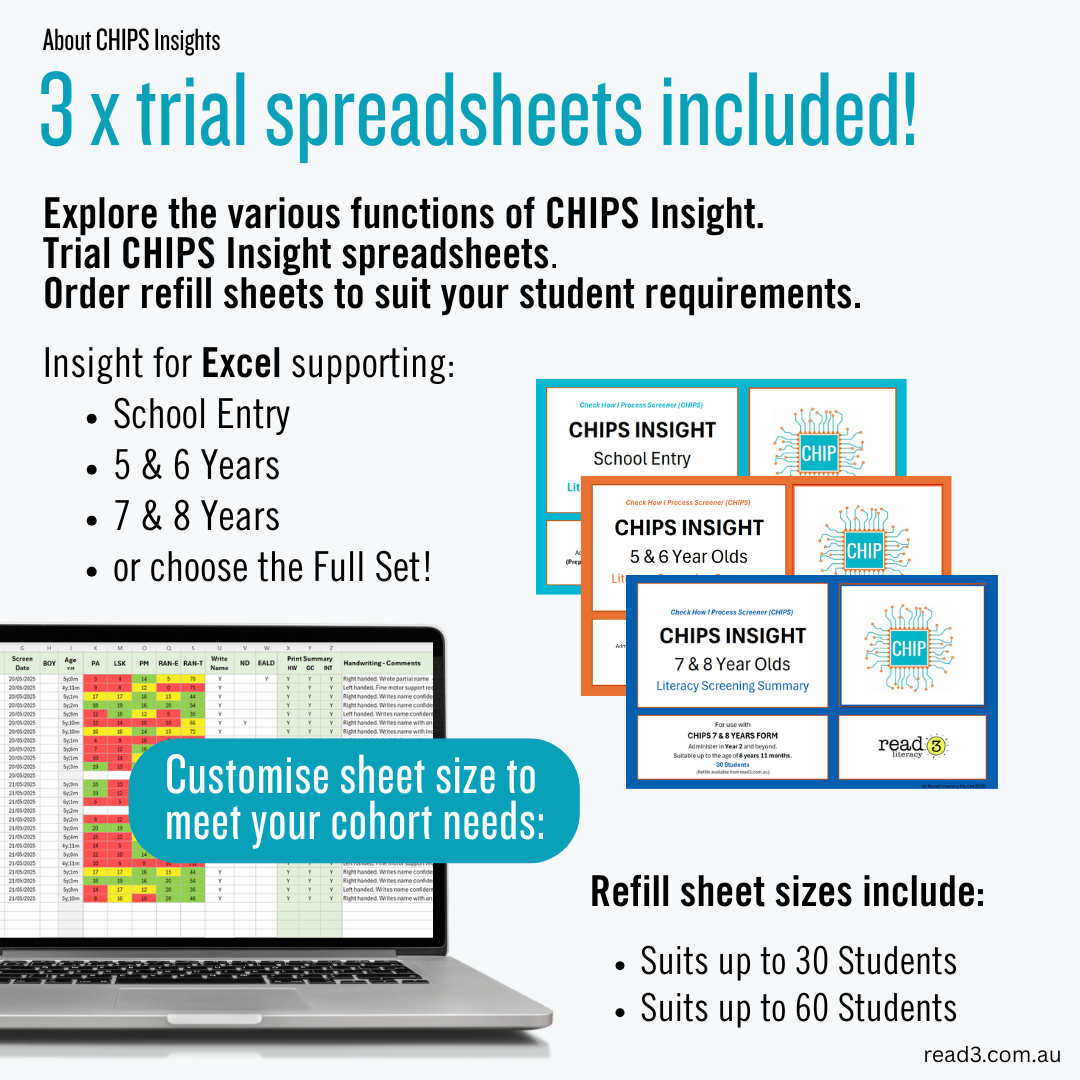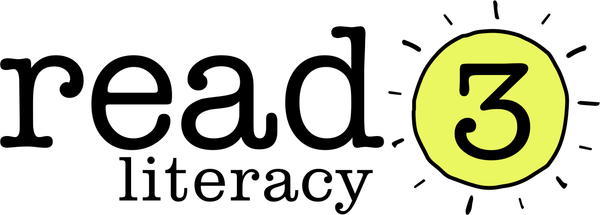CHIPS Early Literacy Screener (Professional Use)
CHIPS Early Literacy Screener (Professional Use)
Couldn't load pickup availability
FREE: CHIPS early literacy screener. The Check How I Process Screener (CHIPS) is a free, informal, evidence-based screener that examines four processing skills known to impact early literacy development. Results may assist with early detection of literacy challenges, and provide greater understanding of the processing difficulties of each struggling reader. Screening time is approximately 15 minutes per child.
Learn more about CHIPS
ADD: CHIPS Insight to your order, for data-driven intervention recommendations and reports! Enter student results into the CHIPS Insight Spreadsheet for speedy analysis of CHIPS results; intervention recommendations (Tier 2 or Tier 3) based on individual risk profiles, and auto-generated literacy screening summaries. Build your understanding of the impact of processing weaknesses, and streamline allocation to intervention groups!
Learn more about CHIPS Insight
About CHIPS
What does CHIPS assess?
Reading researchers** have identified four cognitive processing skills that can predict a child’s ability to learn to read. These include:
- Phonological Awareness (PA)
- Letter-Sound Knowledge (LSK)
- Phonological Working Memory (PM)
- Rapid Automatic Naming (RAN)
The number and severity of a child’s processing weaknesses will affect their reading accuracy, reading fluency, or both. These difficulties, in turn, can affect a child’s reading comprehension.
Identifying and supporting students with specific strategies in the early years will prevent children with less mature skills from falling behind, and will provide the crucial intervention needed for children at-risk of developmental dyslexia.
Visit About CHIPS for full details and FAQs.
Why is CHIPS different?
Most literacy screeners focus on the phonic skills related to reading accuracy (PA and LSK). However, the impact weak PM and RAN has on early literacy is significant. Many children who ‘fail to start’ and ‘fail to respond’ to reading instruction show these underlying deficits. Screening all four areas gives you a clearer picture of the complexity and severity of each child’s reading risk profile.
Is CHIPS normed?
No. CHIPS is an informal screening procedure to help you flag children at risk of reading difficulties. It is not to be used for identification or diagnostic purposes. If this screener does not address your concerns, formal screening using standardised tests is recommended.
Who is CHIPS suitable for?
Children starting school
CHIPS (School Entry Form) should be used on entry to formal schooling (Terms 1 & 2. This form screens pre-reading measures known to affect literacy development and will help you identify at-risk children.
5-6 year olds
CHIPS (Form: 5 & 6 Year Olds) can be used as an early literacy screener for children during the first two years of school once some formal literacy instruction has been provided. This form screens cognitive processing skills and early phonic skills.
7–8 year olds
CHIPS (Form: 7 & 8 Year Olds) can be used to review processing skills and phonic skills in children who have responded poorly to literacy instruction. Use screening results to guide your intervention.
What you will receive with CHIPS
This is a digital product. Upon ordering you will be able to instantly download a screener pack containing all three screeners. Content include:
- CHIP Screener Overview
instructions on how to administer the screener and analyse results - CHIPS Score Sheet
- CHIPS Student Reading Sheet
- CHIPS Student Writing Sheet
- CHIPS Student Reading Digital Booklet
You are authorised to print unlimited copies of CHIPS for personal use, or professional use across an educational institution, learning support division or tutoring service. You are not authorised to share the digital file.
About CHIPS Insight
Features of CHIPS Insight
Need help interpreting CHIPS results? Unsure what intervention is required?
CHIPS Insight takes the guesswork out of intervention recommendations. Enter student data into the CHIPS Insight Excel spreadsheets and watch the magic happen!
- colour-coded scores for each processing skill
- your cohort automatically triaged for intervention (Tier 1, Tier 2 or Tier 3) based on the number and severity of processing weaknesses
- individual student screening summaries generated automatically
Visit About CHIPS Insight for full details and FAQs.
How CHIPS Insight works (3 mins)
Who is CHIPS Insight for?
Classroom teachers looking to conduct class-wide literacy screening on entry to school, or to screen new or struggling students in Year 1 or Year 2. Individual results will determine the intervention recommendations.
Learning support teams looking to gain a greater understanding of which processing skills are holding their struggling students back and what level of intervention is required (Tier 2 or Tier 3).
Speech Pathologists looking for a simple way to summarise screening results and report to parents and schools.
What you receive with CHIPS Insight:
This is a digital product. Upon ordering you will be able to instantly download your CHIPS Insight Starter Kit containing:
- Detailed Instruction Manual
- 1-hour of online learning
- 3x Sample Insight Excel spreadsheets (5 students per sheet)
- School Entry
- 5 & 6 Years
- 7 & 8 Years
Once you are familiar with CHIPS Insight, order the CHIPS Insight Refills that best meet your cohort needs.
Placing students in the Read3 program
CHIPS and CHIPS Insight are directly linked to the Read3 program, a literacy intervention that uniquely supports all four processing areas. Children requiring intensive intervention will be flagged accordingly during the screening process.
* Vaughn, S., & Fletcher, J.M. (2021). Identifying & teaching students with significant reading problems. American Educator, Winter 2020–21 1-11.
** Ozernov-Palchik O, Norton ES, Sideridis G, Beach SD, Wolf M, Gabrieli JDE and Gaab N.(2017) Longitudinal stability of pre-reading skill profiles of kindergarten children: implications for early screening and theories of reading. Developmental Science 2017 Sep: 20(5).
Share











